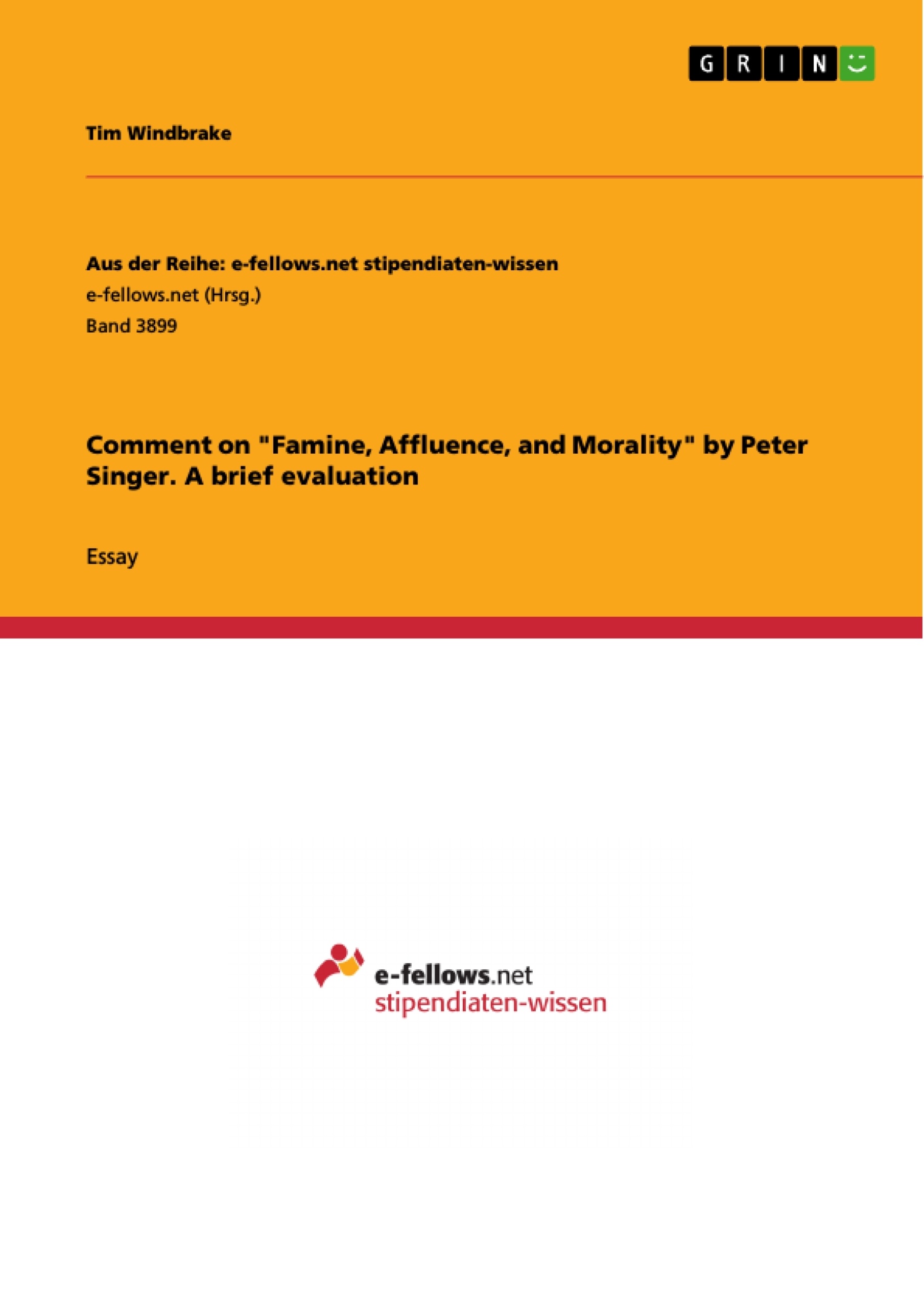This essay claims that Singer’s argument, "We ought to be preventing as much suffering as we can without sacrificing something else of comparable moral importance", is valid but unsound. It acknowledges his overall purpose to alleviate absolute poverty, and his more recent attempts of rewriting the concept to make his conclusion less demanding and thereby more appealing to a broader audience. Nevertheless, this essay will solely focus on the strong version of his initial argument.
Table of Contents
- Singer's argument
- Issues with Premise 2 – its vagueness and its justification
Objectives and Key Themes
This essay critically evaluates Peter Singer's argument that we ought to prevent suffering without sacrificing something of comparable moral importance. It focuses on the strong version of Singer's argument, examining its validity and soundness.
- Critical analysis of Singer's three premises.
- Evaluation of the "Drowning Child" analogy.
- The ambiguity of "comparable moral significance."
- The implications of Singer's argument for personal sacrifice.
- Discussion of the limitations of Singer's approach.
Chapter Summaries
Singer's argument: This section explains and evaluates Singer's argument, which is presented as three premises leading to a conclusion. Premise 1, stating that death and suffering are bad, is considered true and uncontroversial. Premise 3, arguing that preventing suffering is possible without sacrificing something of comparable moral significance (e.g., donating to charity), is also deemed true, although subject to debate regarding the effectiveness of aid organizations. The core of the critique centers on Premise 2, which claims that if one can prevent something bad without sacrificing something of comparable moral significance, one ought to do so. The essay establishes that the argument's validity hinges on the truth of all three premises.
Issues with Premise 2 – its vagueness and its justification: This section delves into the problems with Premise 2. The first issue highlights the vagueness surrounding "comparable moral significance," particularly concerning non-financial sacrifices like bodily harm. The essay argues that the lack of clear definition makes the premise overly demanding, potentially requiring extreme sacrifices that most people would find unacceptable. The second issue focuses on the "Drowning Child" analogy used to justify Premise 2. The essay contends that this analogy is misleading, as it doesn't accurately represent the full implications of Singer's argument, which necessitates sacrificing until reaching marginal utility – a level where further sacrifice would make the donor worse off than the recipient. The essay argues that this extreme interpretation of the premise is intuitively unacceptable to most people, thus undermining the justification for Premise 2 and, consequently, the soundness of Singer's argument as a whole.
Keywords
Peter Singer, effective altruism, moral obligation, comparable moral significance, Drowning Child analogy, marginal utility, poverty alleviation, philosophical ethics, argument validity, argument soundness.
Frequently Asked Questions: Critical Evaluation of Peter Singer's Argument
What is the main focus of this essay?
This essay critically evaluates Peter Singer's argument that we ought to prevent suffering without sacrificing something of comparable moral importance. It concentrates on the strong version of Singer's argument, examining its validity and soundness by analyzing its premises and the "Drowning Child" analogy.
What are the key themes explored in the essay?
Key themes include a critical analysis of Singer's three premises, evaluation of the "Drowning Child" analogy, the ambiguity of "comparable moral significance," the implications of Singer's argument for personal sacrifice, and a discussion of the limitations of Singer's approach.
What are Singer's three premises, and how are they evaluated?
Singer's argument consists of three premises: 1) Suffering and death are bad; 2) If it is in our power to prevent something bad from happening, without thereby sacrificing anything of comparable moral importance, we ought, morally, to do it; 3) It is in our power to prevent much suffering and death without sacrificing anything of comparable moral importance. Premise 1 is considered true and uncontroversial. Premise 3 is deemed true, though debated regarding aid organization effectiveness. The essay's core critique centers on Premise 2.
What are the main criticisms of Premise 2?
The essay highlights two major issues with Premise 2. First, the vagueness of "comparable moral significance" is criticized, especially concerning non-financial sacrifices. This lack of clarity makes the premise overly demanding, potentially requiring extreme sacrifices. Second, the "Drowning Child" analogy is deemed misleading, as it doesn't fully represent the implications of Singer's argument which necessitates sacrifice until marginal utility is reached. This extreme interpretation is considered intuitively unacceptable, undermining Premise 2 and the overall argument's soundness.
What is the significance of the "Drowning Child" analogy?
Singer uses the "Drowning Child" analogy to illustrate Premise 2. The essay argues that this analogy is a simplification that does not accurately reflect the full extent of the moral obligation implied by Singer's argument, which demands ongoing sacrifice until reaching a point of marginal utility. The essay contends this extreme interpretation undermines the analogy's effectiveness and the justification for Premise 2.
What is the concept of "marginal utility" in relation to Singer's argument?
Marginal utility refers to the point where further sacrifice would make the donor worse off than the recipient. Singer's argument, according to the essay, implies a level of sacrifice extending to this point, a level considered extreme and intuitively unacceptable by many.
What are the overall conclusions of the essay regarding Singer's argument?
The essay concludes that the vagueness of "comparable moral significance" and the misleading nature of the "Drowning Child" analogy significantly weaken Premise 2, ultimately undermining the soundness of Singer's argument. The essay suggests that the extreme implications of the argument, particularly the concept of sacrificing until marginal utility is reached, are intuitively problematic and challenge the argument's acceptance.
What are the key terms associated with this essay?
Key terms include Peter Singer, effective altruism, moral obligation, comparable moral significance, Drowning Child analogy, marginal utility, poverty alleviation, philosophical ethics, argument validity, and argument soundness.
- Quote paper
- Tim Windbrake (Author), 2020, Comment on "Famine, Affluence, and Morality" by Peter Singer. A brief evaluation, Munich, GRIN Verlag, https://www.grin.com/document/1128118



